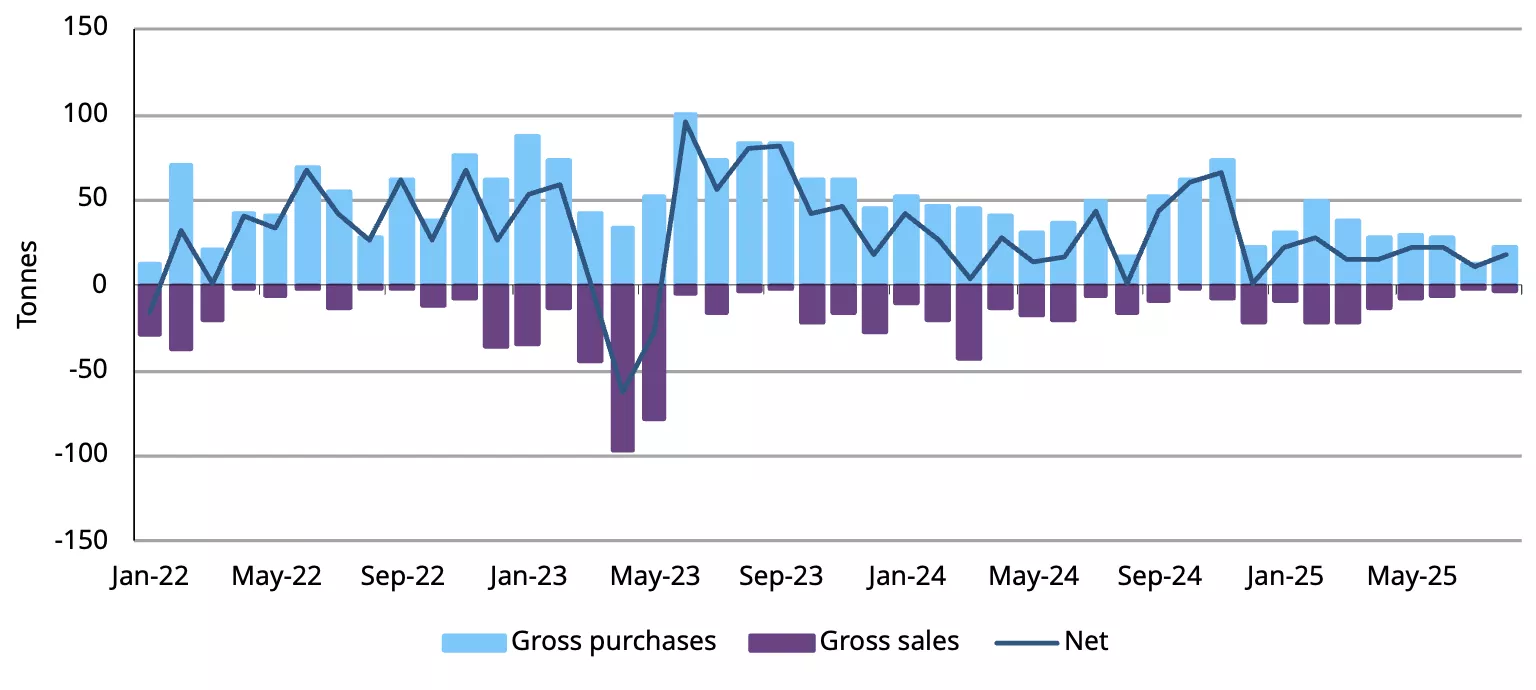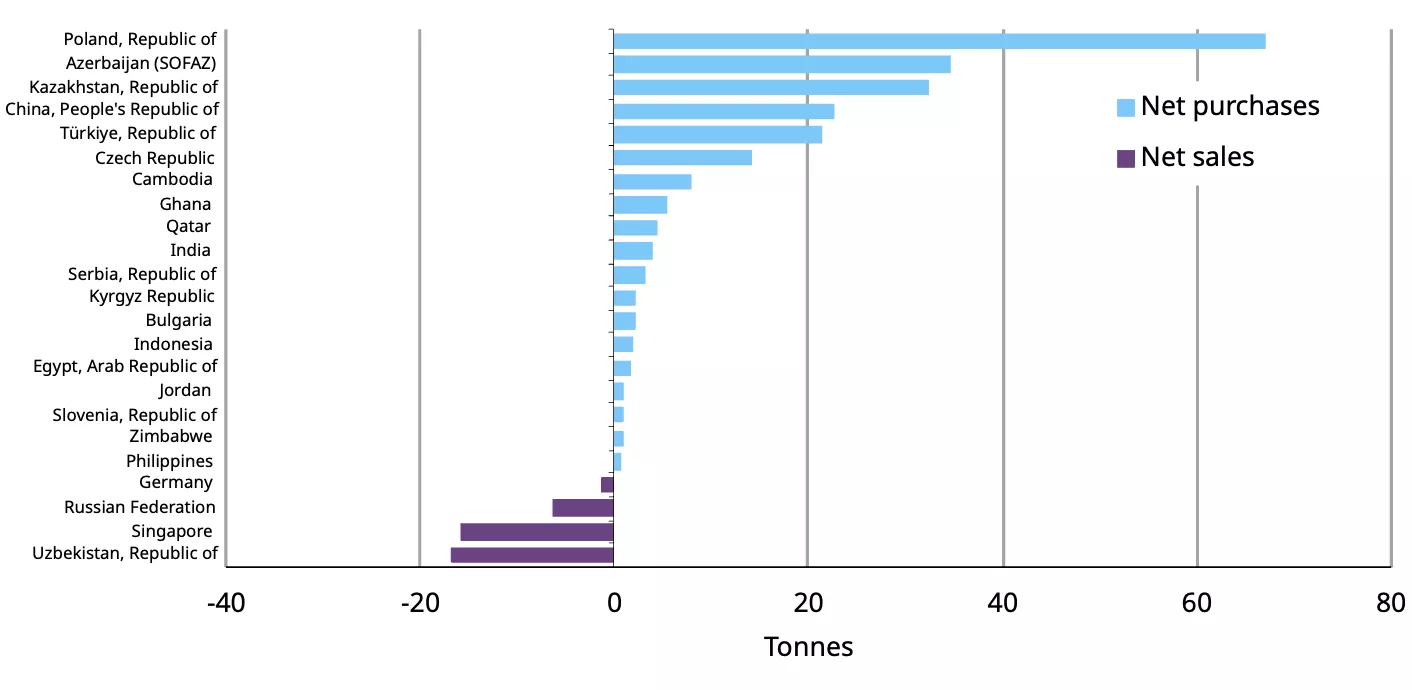Central bank gold statistics: Central bank gold buying rebounds in August
3 October, 2025
Highlights
- Central banks added a net 19t to global reserves in August
- The National Bank of Kazakhstan was the largest gold buyer in the month, while the National Bank of Bulgaria and the Central Reserve Bank of El Salvador also joined the list of buyers
- The National Bank of Poland – the largest purchaser y-t-d – reaffirmed its commitment to gold by increasing its target share.
Central banks added a net 19t to global gold reserves in August, based on reported data from both the IMF and respective central banks. This is broadly in line with monthly net purchases between March and June, and a strong rebound from the 11t added in July.1
Chart 1: Central banks return to buying form in August
Monthly reported central bank activity, tonnes*

* Data to 31 August 2025 where available.
Source: IMF, respective central banks, World Gold Council
As we’ve noted previously, the recent gold price rally, which has reached multiple new all-time highs so far this year, likely remains a constraint on the level of buying by central banks. It may be a factor in more tactical selling too. But the recent moderation in buying does not necessarily signal that central banks as a whole are losing interest in gold. In fact, recent developments, which we discuss below – show that central banks remain keen to continue increasing their exposure.
We’ll be discussing the full Q3 picture for central bank gold demand in our next Gold Demand Trends report, which will be published on 30 October 2025.
Bulgaria joins regular gold buyers in August
During August seven central banks reported increases (of one tonne or more) in their gold reserves. In contrast, only one central bank reported a decline in gold reserves in August.
- The National Bank of Kazakhstan added 8t, the sixth consecutive month of buying. Its gold holdings now total 316t, 32t higher than at the end of 2024
- Bulgarian National Bank gold reserves rose by 2t, the largest monthly increase since June 1997 (8t), to 43t. In January 2026 Bulgaria will become the 21st member state of the eurozone and may transfer some gold to the ECB as part of the accession procedure2
- The Central Bank of Turkey added another 2t to official gold reserves (comprising central bank and Treasury holdings). Y-t-d official reserves have risen by 21t to 639t
- The People's Bank of China reported a 2t purchase, the tenth consecutive reported monthly increase in gold reserves. Total gold holdings have now crept past 2,300t, but still account for 7% of total international reserves
- The Central Bank of Uzbekistan also added 2t during the month. Total gold reserves now stand at 366t, 17t lower than at the end of 2024
- The Czech National Bank (CNB) continued its steady accumulation of gold, purchasing a further 2t. This extends the bank’s monthly buying streak to 30 months, and lifts total gold reserves to 65t. The CNB aims to hold 100t of gold as part of its international reserves by the end of 20283
- The Bank of Ghana bought 2t, lifting its y-t-d buying to 5t and its gold reserves to 36t
- Bank Indonesia reported a 2t increase in its gold holdings to 80t in August, with gold now accounting for 5.9% of total reserves. This follows a correction in the data reported by the IMF, which had previously registered an 11t decrease in Indonesia’s gold reserves
- Based on data available at the time of writing, the Central Bank of Russia (3t) was the only seller of gold. The reduction in Russian gold reserves is likely related to its coin-minting programme.4
Poland raises gold share target
In September the National Bank of Poland (NBP) confirmed that it would be raising the target gold share within its international reserves from 20% to 30%. Having reached its previous target earlier this year, due to both sizeable buying and price appreciation, the NBP has since kept the level of its gold reserves unchanged. This new target indicates that the NBP will resume active gold purchases, although the bank did make clear that: “The scale and pace of purchases will depend on market conditions.” Despite the recent pause in accumulation, the NBP remains the leading buyer this year, having added 67t to its gold reserves y-t-d. Total gold holdings stood at 515t at the end of August, accounting for 22% of total reserves.
Chart 2: The National Bank of Poland remains the largest buyer y-t-d despite recent pause
Y-t-d central bank net purchases and sales, tonnes*

*Data to 31 August 2025 where available. SOFAZ represents the gold reserves of the State Oil Fund of Azerbaijan (SOFAZ).
Source: IMF, respective central banks, World Gold Council
El Salvador boosts gold reserves
The Central Reserve Bank of El Salvador also reported an increase of 13,999oz (less than 0.5t) in its gold reserves in September.5 In announcing the purchase, the bank noted: “… this acquisition is a long-term positioning based on a prudential balance in the composition of the assets that make up the International Reserves.” Following the addition, the bank holds just under 2t of gold.
Footnotes
1Note: the July net total has been revised to +11t following a correction to published data for Indonesia, which erroneously stated a decline of 11t in July.
2The ECB and gold, World Gold Council
3The CNB’s gold, Czech National Bank
4Commemorative and Investment Coins of the Bank of Russia, The Central Bank of the Russian Federation
5BCR acquires 13,999 troy ounces of gold as part of the diversification strategy of its International Reserves, Central Bank of El Salvador
Disclaimer
Important information and disclaimers
© 2025 World Gold Council. All rights reserved. World Gold Council and the Circle device are trademarks of the World Gold Council or its affiliates.
Reproduction or redistribution of any of this information is expressly prohibited without the prior written consent of World Gold Council or the appropriate copyright owners, except as specifically provided below. Information and statistics are copyright © and/or other intellectual property of the World Gold Council or its affiliates or third-party providers identified herein. All rights of the respective owners are reserved.
The use of the statistics in this information is permitted for the purposes of review and commentary (including media commentary) in line with fair industry practice, subject to the following two pre-conditions: (i) only limited extracts of data or analysis be used; and (ii) any and all use of these statistics is accompanied by a citation to World Gold Council and, where appropriate, to Metals Focus or other identified copyright owners as their source. World Gold Council is affiliated with Metals Focus.
The World Gold Council and its affiliates do not guarantee the accuracy or completeness of any information nor accept responsibility for any losses or damages arising directly or indirectly from the use of this information.
This information is for educational purposes only and by receiving this information, you agree with its intended purpose. Nothing contained herein is intended to constitute a recommendation, investment advice, or offer for the purchase or sale of gold, any gold-related products or services or any other products, services, securities or financial instruments (collectively, “Services”). This information does not take into account any investment objectives, financial situation or particular needs of any particular person.
Diversification does not guarantee any investment returns and does not eliminate the risk of loss. Past performance is not necessarily indicative of future results. The resulting performance of any investment outcomes that can be generated through allocation to gold are hypothetical in nature, may not reflect actual investment results and are not guarantees of future results. The World Gold Council and its affiliates do not guarantee or warranty any calculations and models used in any hypothetical portfolios or any outcomes resulting from any such use. Investors should discuss their individual circumstances with their appropriate investment professionals before making any decision regarding any Services or investments.
This information may contain forward-looking statements, such as statements which use the words “believes”, “expects”, “may”, or “suggests”, or similar terminology, which are based on current expectations and are subject to change. Forward-looking statements involve a number of risks and uncertainties. There can be no assurance that any forward-looking statements will be achieved. World Gold Council and its affiliates assume no responsibility for updating any forward-looking statements.
Information regarding the LBMA Gold Price
The LBMA Gold Price is administered and published by ICE Benchmark Administration Limited (IBA). The LBMA Gold Price is a trademark of Precious Metals Prices Limited and is licensed to IBA as administrator of the LBMA Gold Price. ICE and ICE Benchmark Administration are registered trademarks of IBA and/or its affiliates. The LBMA Gold Price is used by the World Gold Council with permission under license by IBA.
Published LBMA Gold Price information may not be indicative of future LBMA Gold Price information or performance. None of IBA, Intercontinental Exchange, Inc. (ICE) or any third party that provides data used to administer or determine the LBMA Gold Price (data providers), or any of its or their affiliates makes any claim, prediction, warranty or representation whatsoever as to the timeliness, accuracy or completeness of LBMA Gold Price information, the results to be obtained from any use of LBMA Gold Price information, or the appropriateness or suitability of using LBMA Gold Price information for any particular purpose. to the fullest extent permitted by applicable law, all implied terms, conditions and warranties, including, without limitation, as to quality, merchantability, fitness for purpose, title or non-infringement, in relation to LBMA Gold Price information, are hereby excluded, and none of IBA, ICE or any data provider, or any of its or their affiliates will be liable in contract or tort (including negligence), for breach of statutory duty or nuisance, or under antitrust laws, for misrepresentation or otherwise, in respect of any inaccuracies, errors, omissions, delays, failures, cessations or changes (material or otherwise) in LBMA Gold Price information, or for any damage, expense or other loss (whether direct or indirect) you may suffer arising out of or in connection with LBMA Gold Price information or any reliance you may place upon it.
LBMA Gold Price information provided by the World Gold Council may be used by you internally to review the analysis provided by the World Gold Council, but may not be used for any other purpose. LBMA Gold Price information provided by the World Gold Council may not be disclosed by you to anyone else.
